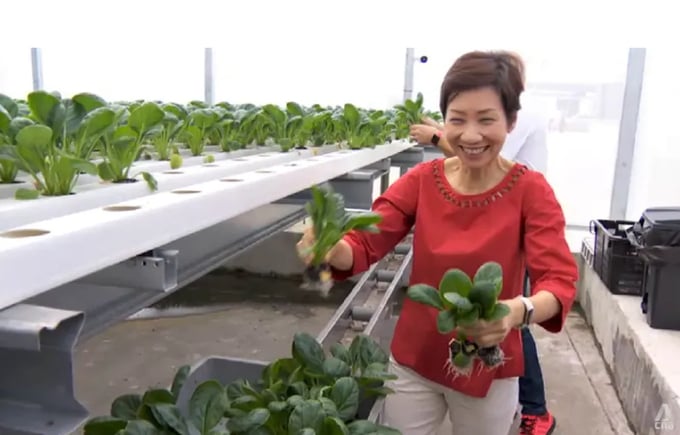May 18, 2025 | 19:39 GMT +7
May 18, 2025 | 19:39 GMT +7
Hotline: 0913.378.918
May 18, 2025 | 19:39 GMT +7
Hotline: 0913.378.918

Singapore's Minister for Sustainability and the Environment Grace Fu holds vegetables at urban rooftop farm ComCrop
Hidden among the concrete facades of factories in the Woodlands East Industrial Estate is a lush, tranquil rooftop space flourishing with homegrown chye sim, mint and basil.
The rooftop farm is owned by ComCrop, one of Singapore’s pioneer companies in urban farming, and it is on track to ramp up its production tenfold.
This follows a grant from the Singapore Food Agency (SFA), as part of efforts to meet the country's food security goals.
ComCrop has made strides in increasing its yield with the use of technology, moving steadily towards its target to produce more than 20 tonnes of greens in a month, compared to the same amount in a year with their previous set-up.
The firm's hydroponic greenhouse uses water-based mineral nutrient solutions to grow vegetables in natural sunlight, with an automated farming system and a mobile gulley system to maximise the use of space, increase productivity, and reduce manpower.
The farm also uses remote monitoring to manage the growth of its plants and lighting technology to conduct daylight extension, ensuring a consistent daily harvest.
“The weather station monitors the weather every day, and it determines if we need to extend the daylight – and (if we do), the lights will be turned on automatically to compensate so we get consistent growth on a daily basis,” said Mr Peter Barber, co-owner and chief executive officer of ComCrop.
He was speaking at the opening of the farm’s new facility on Sunday (Oct 9).
The farm currently produces enough to send a daily haul of fresh vegetables to supermarket chain NTUC FairPrice and online grocer RedMart.
LOCALS KNOW LITTLE ABOUT HOME-GROWN PRODUCE
Despite the availability of local crops and their competitive prices, Mr Barber said that sales have been slow.
People do not know about the existence of urban farming and its benefits, said Mr Barber.
“A lot of people didn't believe that this could be done, to be able to grow vegetables in an urban environment and to grow them on a rooftop,” Mr Barber told CNA.
“That was already a big challenge, but we've worked out how to do that and we've got a really strong robust system now.”
The next challenge is to get people to buy local produce, he said, “not just because it's grown here, but also because it's healthier”.
“In our case, it's grown without pesticides, so it's definitely much healthier than what you're getting from some of the international supply,” he added.
Singapore imports more than 90 per cent of its food source, and it is critical for the country to proactively find ways to ensure the resilience of its food supplies, Minister for Sustainability and the Environment Grace Fu said in a speech at the launch of the facility.
While the worst of the COVID-19 pandemic appears to be over, geopolitical tensions and extreme weather events caused by climate change can continue to cause disruptions in global food production and supply, Ms Fu said.
“It is with this purpose in mind that we put forward our ‘30 by 30’ goal. This will provide us with a significant buffer against food supply disruptions. The ‘30 by 30’ goal is an ambitious one, especially since we're striving to achieve it through highly productive, climate-resilient, and resource-efficient means,” she said.
BUYING LOCAL PRODUCE
ComCrop is the first of seven recipients to utilise SFA’s "30 by 30" grant to expand, automate and employ technology to boost yields and efficiency at its hybrid greenhouse facility in Woodlands.
The “30 by 30” initiative aims to build up Singapore’s capability to meet 30 per cent of the country’s nutritional needs with food produced locally by 2030.
Apart from being prepared for supply disruptions from international food sources, close proximity from farm to table means local produce is fresher and more environmentally sustainable, said Ms Fu, calling for consumers to support local products.
“It is fresh, it incurs less transportation and therefore less miles on the road,” she said.
“Higher local demand for homegrown produce will keep our farms commercially viable and spur our farmers to become more productive. Your support of local produce will go a long way in strengthening Singapore's food security.”
Local greens are marked by bright one- and two-star signs on their packaging, with one star representing produce as homegrown, and two stars providing additional quality assurance that the farmers' management practices have been audited and certified to produce food in an environmentally friendly and socially responsible manner.
Mr Barber echoed Ms Fu’s call to buy Singapore-grown food. Consumers’ support is vital in ensuring the advancement of local farms, he said.
“Basically our food security in the future is determined by our purchasing decisions in the supermarket,” he added. “So if we keep buying local, that means farms like us can invest more, we can grow more, and then you'll have more variety.”
(CNA)

(VAN) Fourth most important food crop in peril as Latin America and Caribbean suffer from slow-onset climate disaster.

(VAN) Shifting market dynamics and the noise around new legislation has propelled Trouw Nutrition’s research around early life nutrition in poultry. Today, it continues to be a key area of research.

(VAN) India is concerned about its food security and the livelihoods of its farmers if more US food imports are allowed.

(VAN) FAO's Director-General emphasises the need to work together to transform agrifood systems.

(VAN) Europe is facing its worst outbreak of foot-and-mouth since the start of the century.

(VAN) The central authorities, in early April, released a 10-year plan for rural vitalization.

(VAN) Viterra marked a significant milestone in its carbon measurement program in Argentina, called Ígaris, reaching 1 million soybean hectares measured.